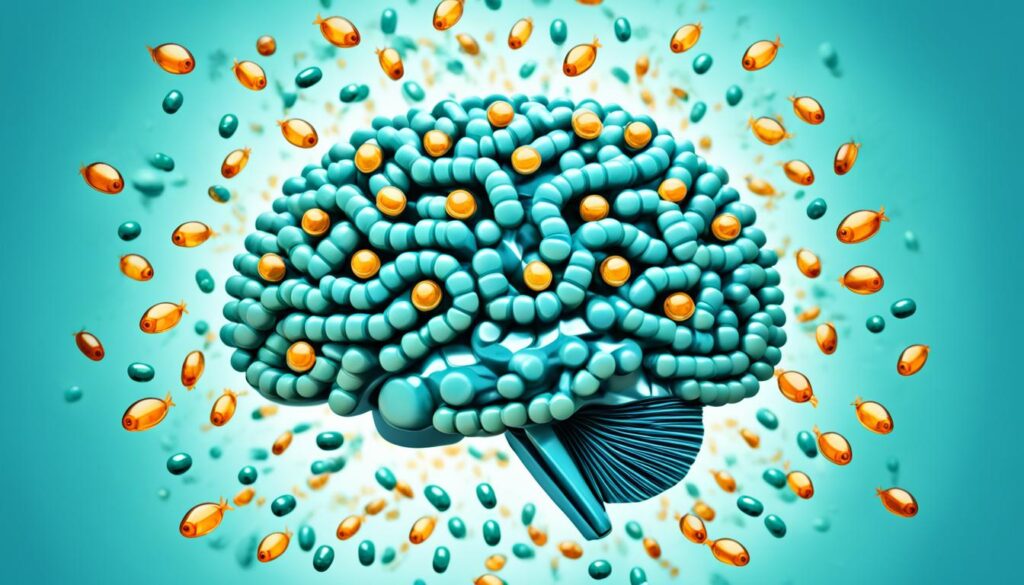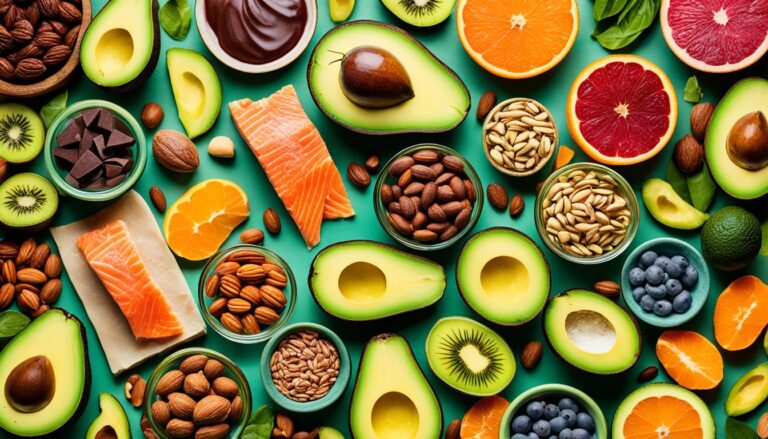Imagine having a superpower that protects your heart from many problems. Look no further than omega-3 fatty acids. These nutrients are heroes in the world of health especially for your heart.
They can really change the game for heart health. But, you might wonder, what makes these small molecules so strong? And how do they fight against heart disease so well? Let’s explore the amazing benefits of omega-3s together.
Key Takeaways
- Omega-3 fatty acids are essential nutrients that play a crucial role in supporting heart health.
- They have been extensively studied for their ability to reduce the risk of various cardiovascular conditions.
- Omega-3s, particularly EPA and DHA, offer a range of heart-healthy benefits.
- These remarkable fatty acids can help lower cholesterol, blood pressure, and inflammation.
- Incorporating omega-3-rich foods or supplements into your diet can be a game-changer for cardiovascular wellness.
A Fishy Tale The Incredible Benefits of Omega-3s
Omega-3 fatty acids are like unsung heroes in the food world. They are mainly found in fatty fish and some plants. Omega-3s like EPA and DHA are key for keeping our hearts, brains, and even unborn babies healthy.
Unleashing the Power of EPA and DHA
EPA is a real star for its benefits against inflammation. It cuts the chance of heart disease and other long-term illnesses. DHA, meanwhile, is crucial for our brain health and thinking skills. It’s needed by kids and grown-ups alike.
Together, EPA and DHA make a powerful pair. They help lower your blood pressure and bad cholesterol. They also boost your mood and keep your memory sharp.
Sourcing Omega-3s From the Ocean to Your Plate
The top sources of EPA and DHA are fatty fish like salmon, mackerel, and sardines. Including these fish in your meals is a great way to get your omega-3s.
If you’re into plants, nuts and seeds like walnuts, flaxseeds, and chia are good too. They have ALA, which your body can change into EPA and DHA. But it’s not as efficient as getting them straight from fish.
Wherever you pick, sea or land, adding omega-3s to your diet is smart. It helps you stay healthy and happy in many ways.

Omega-3s are the nutritional equivalent of a superhero, tackling a wide range of health concerns with a single bound.
Omega-3 are essential fatty acids that support heart health and may reduce the r
Omega-3 fatty acids are key because our bodies don’t make them. They come from what we eat or take as supplements. They are vital for heart health and lower the chance of heart issues like disease, stroke, and high blood pressure.
EPA and DHA are the main omega-3 fatty acids. They are found in fish and seafood. Both help keep our hearts healthy and support our overall health.
Omega-3s and Heart Health
Studies show omega-3s are very good for the heart. They can:
- Lower triglycerides, which can cause heart disease.
- Lessen inflammation, important for heart health.
- Help blood vessels work better, improving blood flow.
- Lower the risk of heart attacks and strokes by preventing blood clots.
Many health groups advise eating omega-3 rich foods as part of a healthy diet. This helps keep your heart strong.
Omega-3 fatty acids are truly the superheroes of the nutrient world when it comes to supporting cardiovascular health.
Adding omega-3 foods or good supplements to your diet can make a big difference. This small change can protect you from heart problems.

The Heart Healthy Superhero Omega-3’s Role in Cardiovascular Protection
Omega-3 fatty acids act like superheroes for your heart. They offer lots of benefits that are great for your heart. By helping to lower high cholesterol and high blood pressure, omega-3s fight against heart disease.
Lowering Cholesterol and Blood Pressure A Dynamic Duo
Omega-3s lower LDL bad cholesterol and increase HDL good cholesterol. This helps your heart in a big way. It reduces the risk of heart problems by preventing the buildup of plaque in your arteries.
They also lower high blood pressure. This is key for a healthy heart. Omega-3s help your blood vessels relax, promoting good blood flow and less strain on your heart.
| Cardiovascular Benefit | Impact of Omega-3s |
|---|---|
| Cholesterol Reduction | Lowers LDL bad cholesterol, increases HDL good cholesterol |
| Blood Pressure Lowering | Helps relax and dilate blood vessels, reducing strain on the heart |
Omega-3s cover two big heart risks, making them vital for a healthy heart. They lower heart disease, heart attack, and stroke risks. It’s clear why they’re seen as heart-saving heroes.
Omega-3s are like the dynamic duo of heart health, working tirelessly to lower cholesterol and blood pressure and keep our cardiovascular system in top shape.

Inflammation Be Gone! The Anti-Inflammatory Powers of Omega-3s
Omega-3 fatty acids are key to a healthy heart and battling inflammation. Chronic inflammation harms our health, especially causing heart problems. Omega-3s help us fight this threat and stay well.
Omega-3s, like EPA and DHA, are special. They can stop the body from making harmful molecules that cause inflammation. This cuts the risk of various diseases.
Research shows people with more omega-3s in their blood have less inflammation. This means lower risk of heart issues and better health. Omega-3s address the main cause of inflammation.
Omega-3 fatty acids are like a double-edged sword, fighting inflammation on both the cellular and systemic levels.
The goodness of omega-3s isn’t limited to the heart. They help with conditions like arthritis, asthma, and some cancers. By eating more omega-3 foods or taking quality fish oil, you can reduce inflammation and improve your health.

Don’t forget, the secret with omega-3s is balance. By making them part of your daily diet, you can benefit from their anti-inflammatory effects. Start your journey to a healthier, vibrant life with omega-3s.
Brain Boost How Omega-3s Enhance Cognitive Function
Omega-3 fatty acids are crucial for a strong heart and brain health. DHA, one type of omega-3, is key for the brain’s gray matter.
Keeping Your Grey Matter in Top Shape
Adding omega-3s to your diet helps your brain work better. They boost memory, focus, and mental sharpness. Omega-3s might also slow down brain aging.
DHA helps the brain grow and stay healthy by building and keeping nerve connections. This improves how your brain handles information and solves problems.
Omega-3s are like a supercharge for your brain, helping to keep your grey matter in peak condition.
To get omega-3s’ full benefits for your brain, eat fatty fish like salmon, mackerel, and sardines often. Or, take a high-quality fish oil supplement for an easy omega-3 dose.

Choose omega-3s for a brain power-up. They may help memory, focus, and brain sharpness. Let these fatty acids help you reach your cognitive peak.
Prenatal Perfection Omega-3s and Fetal Development
Expectant mothers eagerly await their babies. They might not know how important omega-3 fatty acids are. These substances are crucial for a baby’s brain, eyes, and organs during the early stages.
Getting enough omega-3 during pregnancy helps the baby grow better. It ensures the baby starts life strong. Omega-3 helps with learning and eyesight, making it very beneficial.
The Omega-3 Advantage
EPA and DHA, the key omega-3 fatty acids, are vital now. DHA aids in brain and eye development. Studies show higher DHA in moms leads to better infant brains and eyes.
Breast milk’s omega-3 comes from mom’s diet. By eating foods or taking supplements with omega-3, moms ensure their babies get needed nutrients.
Building a Healthy Foundation
Omega-3 benefits aren’t just for babies. They help moms too. They might lower early birth risk and help avoid depression and complications.
Prioritizing omega-3 helps babies start healthy lives. It sets the path for lifelong well-being.

Adequate omega-3 intake during pregnancy is essential for the healthy growth and development of the baby. These essential fatty acids are the building blocks for the brain, eyes, and other vital organs.
Omega-3 is key for brain and eye growth. It’s crucial for expectant mothers. Making sure to have enough omega-3 can impact the baby’s future health.
Supplementing the Good Stuff The Ins and Outs of Fish Oil Capsules
Fish oil supplements are great for those who can’t get enough omega-3 from their diet alone. But not all these supplements are good quality. In this guide, we’ll talk about what makes a good fish oil capsule. We’ll cover how to spot high-quality options and what to read on the labels.
Decoding the Labels: What to Look for in Quality Supplements
The label carries a lot of important information about a fish oil supplement. It tells you how good it is. When you’re choosing, make sure to check for:
- Omega-3 content: The label should show how much EPA and DHA are in each serving. These are vital omega-3 fatty acids.
- Source of the fish oil: The best come from fish like sardines, anchovies, or mackerel, fished sustainably.
- Purity and freshness: A good product is clean from bad stuff like heavy metals. Also, check the expiration date.
- Gelatin capsules: Soft gels are better than hard tablets because your body can use them more efficiently.
Looking out for these aspects ensures you buy the best fish oil. This means your body gets the most out of the omega-3 it needs.
Omega-3 fish oil supplements are an excellent way to boost your intake of these essential fatty acids, especially if you struggle to get enough from your diet.
Not every fish oil supplement is alike. It’s key to carefully check the labels. Choose one that fits your health goals for your heart, brain, and body overall.
Plant Based Alternatives Getting Your Omega-3s on a Vegan Diet
For vegans and vegetarians, getting omega-3 fatty acids usually means turning to the ocean. The good news is that the plant world provides a lot of options rich in omega-3s. This makes it easy to keep these essential nutrients in your diet while staying plant-based.
Flaxseeds are a major player in the plant-based omega-3 game. Just a few tablespoons give you a good amount of ALA. Your body changes ALA into the omega-3s it needs, like EPA and DHA.
Chia seeds also stand out for their ALA content. You can easily include them in your diet. Try adding them to your oatmeal, blending them into smoothies, or using them in baking for some extra nutrition.
Looking for a hearty source of omega-3 from plants? Walnuts are a top pick. packed with ALA, they’re a great snack or meal addition. They work well in salads or many dishes.
Algae-derived supplements are perfect for those wanting a direct, vegan source of EPA and DHA. This makes them a great alternative to fish oil. They provide the same benefits, but without the fishy taste.
| Plant-Based Omega-3 Source | Omega-3 Content |
|---|---|
| Flaxseeds | 2.5 grams of ALA per tablespoon |
| Chia Seeds | 5 grams of ALA per tablespoon |
| Walnuts | 2.5 grams of ALA per ounce |
| Algae-Derived Supplements | 200-300 mg of EPA and DHA per serving |
Adding these omega-3 sources to your diet ensures you get the fatty acids you need. It lets you enjoy recipes that fit your vegan or vegetarian lifestyle. Try various dishes to see what you enjoy best and nourish your body.
Embracing plant-based omega-3s is a delicious and sustainable way to support your overall health and well-being.
Debunking the Myths Separating Fact from Fiction in the Omega-3 World
Omega-3 fatty acids have become a topic full of myths. It’s important to know the truth about these essential nutrients. In this article, we will take a closer look at common omega-3 myths and the facts behind them.
Myth 1 Omega-3s Can Cure All Ailments
Omega-3s do offer many health benefits, but they are not a miracle cure. They help maintain health in different ways. For example, they can support the heart and brain and help reduce inflammation.
Viewing them as a cure-all is not accurate.
Myth 2 Omega-3s Have Dangerous Side Effects
Some worry about the side effects of omega-3 supplements. But, studies show they’re mostly safe when taken right. Mild stomach issues might happen, but harmful effects are usually not a concern.
Myth 3 Omega-3s Are Only Found in Fish
Fish and seafood are rich in EPA and DHA omega-3s. But, there are other sources. Plant foods like walnuts, flaxseeds, and chia seeds have ALA omega-3. The body can change ALA to EPA and DHA, although not as efficiently.
| Omega-3 Myth | Fact |
|---|---|
| Omega-3s can cure all ailments | Omega-3s offer numerous health benefits, but they are not a miracle cure-all. |
| Omega-3s have dangerous side effects | Omega-3s are generally safe and well-tolerated when consumed in recommended amounts. |
| Omega-3s are only found in fish | While fish and seafood are excellent sources, plant-based options like walnuts and flaxseeds also contain omega-3s. |
Learning the truth about omega-3s helps us use them wisely. Knowing the facts lets us better fit omega-3s into our healthy routines.
The more you know, the better you can navigate the often-confusing world of omega-3s.
Conclusion Embrace the Omega-3 Lifestyle for a Healthier You!
The exploration of omega-3s comes to an end, showing their role as nutritional superheroes. They protect our hearts, boost brain functions, and help in early development. Omega-3s are key for our health.
Choosing an omega-3 rich diet or good supplements is a big step for a healthy future. Imagine a future with less heart risk, better thinking, and fighting off inflammation. This is the magic of omega-3s.
Go all in with omega-3s. Cook tasty salmon or take a fish oil pill. This is a long-term health and happiness choice. Let omega-3s upgrade your life. The future is full of their powerful benefits.





